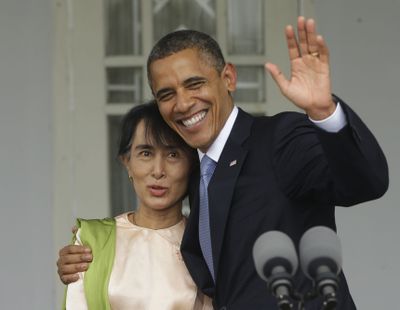Historic stops mark Asia trip
Myanmar gets lift; Cambodia chided

PHNOM PENH, Cambodia – On a history-making trip, President Barack Obama on Monday paid the first visit by an American leader to Myanmar and Cambodia, two Asian countries with troubled histories, one on the mend and the other still a cause of concern.
Obama’s fast-paced trip vividly illustrated the different paths the regional neighbors are taking to overcome legacies of violence, poverty and repression.
Cheered by massive, flag-waving crowds, Obama offered long-isolated Myanmar a “hand of friendship” as it rapidly embraces democratic reforms. Hours later, he arrived in Cambodia to little fanfare, then pointedly criticized the country’s strongman leader on the issue of human rights during a tense meeting.
Obama was an early champion of Myanmar’s sudden transformation to civilian rule following a half-century of military dictatorship. He’s rewarded the country, also known as Burma, with eased economic penalties, increased U.S. investment and now a presidential visit, in part to show other nations the benefits of pursuing similar reforms.
“You’re taking a journey that has the potential to inspire so many people,” Obama said during a speech at Myanmar’s University of Yangon.
The Cambodians are among those Obama is hoping will be motivated. White House officials said he held up Myanmar, a once-pariah state, as a benchmark during his private meeting Monday evening with Prime Minister Hun Sen, the autocratic Cambodian leader who has held power for nearly 30 years. Hun Sen’s rivals have sometimes ended up in jail or in exile.
Unlike the arrangement after Obama’s meetings with Myanmar’s President Thein Sein and democracy leader Aung San Suu Kyi, the U.S. and Cambodian leaders did not speak to the press following their one-on-one talks. They did step before cameras briefly before their meeting to greet each other with a brisk handshake and little warmth.
In private, U.S. officials said, Obama pressed Hun Sen to release political prisoners, stop land seizures and hold free and fair elections. Aides acknowledged the meeting was tense, with the Cambodian leader defending his practices, even as he professed to seek a deeper relationship with the U.S.
Ben Rhodes, Obama’s deputy national security adviser, said the president told Hun Sen that without reforms, Cambodia’s human rights woes would continue to be “an impediment” to that effort.
White House officials emphasized that Obama would not have visited Cambodia had it not been hosting two regional summit meetings the U.S. attends, a rare admonishment of a country on its own soil.
Winding down his trip, Obama talked on the sidelines of the East Asia Summit with Japanese Prime Minister Yoshihiko Noda. Briefly addressing reporters before the private meeting began, Obama called the relationship between the U.S. and Japan a “cornerstone of prosperity and security in the region.” The two leaders discussed jobs, trade and the economy.
Obama also carved out time for Chinese Premier Wen Jiabao in what was likely the president’s last meeting with current Chinese leadership. At the top of the meeting, Obama called the relationship between the U.S. and China “cooperative and constructive” and said it was important that the two countries have “clear rules of the road internationally for trade and investment.”
Obama will return to Washington before dawn Wednesday, in time for the ceremonial pardoning of the Thanksgiving turkey.